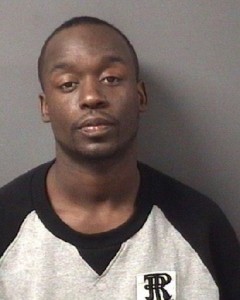Call it the “Making a Murderer” effect.
When jury selection kicks off next week in the second murder trial of two men accused of killing Mercer County corrections officer Carl Batie, prosecutors will ask prospective jurors whether they watched the popular true crime Netflix docuseries and if it impacted their views on police, prosecutors and the criminal justice system.

Hykeem Tucker
During jury selection, prospective jurors are regularly asked about the types of newspapers, magazines and books they read and televisions shows and movies they watch.
Prosecutors and defense attorneys do so to focus in on potential juror biases and will do so moreso in the retrial of suspected killers Maurice Skillman and Hykeem Tucker.
Their first trial, held earlier this year, ended in a mistrial – one of four hung juries and an acquittal in the last six murder trials tried in Mercer County.
The trend has befuddled legal experts who debated whether something is wrong with the way prosecutors present murder cases or if it reflects views of jurors in Mercer County.
This is the first time in Trenton, and possibly New Jersey, that jurors are being asked whether they watched the series, which chronicled the life of Steven Avery, a Wisconsin man who was exonerated by DNA evidence 18 years after he was wrongfully convicted of rape only to end up convicted of murdering 25-year-old photographer Teresa Halbach years after he was released from prison.
A former New Jersey prosecutor said not to discount the impact “Making a Murderer” has had in heightening awareness of wrongful convictions and shaping jurors’ perceptions of law enforcement, especially following round-the-clock coverage of police actions in Ferguson, Baltimore, New York and elsewhere.
“It’s created a shadow over law enforcement,” said Lewis Korngut, who spent six years as homicide chief for the Mercer County Prosecutor’s Office and now does criminal defense work for the Trenton law firm Kamensky Cohen & Riechelson. “You’d be surprised of the people I’ve spoken to who believe everything they hear about that case. It’s created a higher burden for prosecutors in murder cases.”
Avery was charged with Halbach’s murder while his lawyers were litigating a $36 million lawsuit against the Manitowoc County Sheriff’s Department.
The filmmakers of the 10-episode series have been applauded and criticized, some suggesting they uncovered flaws in the criminal justice system while others believe they highlighted aspects of the case that created compelling television but provided an incomplete look of the evidence against Avery and his nephew, Brendan Dassey, who was also convicted of killing Halbach.
Even members of the Mercer County Prosecutor’s Office were swept up in the fervor over “Making a Murderer.”
One Mercer County prosecutor and his wife attended a speaking event in Philadelphia for Dean Strang and Jerome Buting, even having their questions for Avery’s now-famous attorneys read at the forum.

Maurice Skillman
Not everyone is a fan, though.
Assistant Prosecutor James Scott said the filmmakers’ slant provided an “editorialized” narrative that portrayed Avery as a victim of a frame job at the hands of overzealous police and prosecutors.
Avery’s defense attorneys suggested at trial that Manitowoc sheriffs planted evidence because Avery was suing the department for its role in the rape investigation that led to his wrongful conviction.
In recent years, prosecutors, defense lawyers and judges have focused much attention on the so-called CSI effect, referring to the influence of the crime-scene show on jurors’ expectations of forensic evidence in criminal cases.
While Korngut compared the possible effects of “Making a Murderer” to how CSI has impacted jurors over the last 16 years, other legal experts say research suggests any link between the two is anecdotal, relying on lawyers’ opinions in surveys.
Hard data, they say, does not back up the so-called CSI effect.
“Making a Murderer is a paradigm for the new realism in the jury pool,” said Jack Furlong, a criminal defense lawyer in Trenton.
Furlong said prosecutors’ decision to ask jurors about the show demonstrates they are cognizant of the “proposition that not every law enforcement official is a saint and not every prosecutor is interested in the pursuit of justice.”
For decades, jurors had an “unconscious bias in favor of police officers,” Furlong said.
The O.J. Simpson murder case changed everything as the football star’s attorneys pressed upon the frayed nerve of disenchanted blacks who had been brutalized, harassed and watched Los Angeles Police officers get away with beating Rodney King in the early 1990s.
Korngut said trust in law enforcement lost during The Trial of the Century was restored after the September 11 terroristic attacks.
Both Furlong and Korngut agree a spate of police brutality cases have again eroded trust in law enforcement, offering an opening for defense attorneys in a system where prosecutors must prove cases beyond a reasonable doubt.
“The pendulum is swinging back and everyone is trying to figure out how far it swung and how they can get around that,” Furlong said.
“Jurors like to be sleuths,” Korngut said. “They like to solve the case themselves and they sometimes inject facts and they tend to speculate when it’s not there. Speculation is dangerous. The old, ‘To assume is to make an ass out of you and me.’”
That came into play at Skillman’s and Tucker’s first trial.
During deliberations, jurors passed a note asking if they could consider alternative theories.
Korngut said picking juries is tough.
Mercer prosecutors rely on their experiences and do not consult jury experts for help, spokeswoman Casey DeBlasio said.
“A lot of it is demographics,” Korngut said. “What jobs they have. Where they live. Do they have children? Do they have a stake in the community? But a lot of it is feel, from their non-verbal communication. You have to read the jurors.”